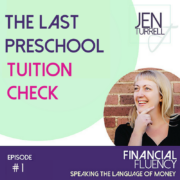Financial Fluency Episode #1: The Last Preschool Tuition Check
Hello and welcome to the first ever episode Financial Fluency: Speaking The Language of Money with me, your host, Jen Turrell.
I am so excited to be here. This is my first ever podcast episode on my own podcast.
Over the course of the past several months, I’ve been on a lot of other people’s podcasts, and I found that I just really loved the format. I loved talking to people and speaking into a microphone.
It suddenly seemed much easier to explain ideas than to sit and try to write them for a blog, and after that find links, and make sure the links worked and later put them into my blog post and do all of that. So, a friend of mine suggested, “Why don’t you just start your own podcast?” And I thought,
“Yes! Why don’t I?”
So here it is, Financial Fluency: Speaking The Language of Money, and I’ve titled this episode “The Last Preschool Tuition Check”, because it’s something I’m celebrating myself right now.
A Big Day
Today, I took my two kids to their first day of school, and for my five-year-old, it was her first day of kindergarten. So, even though today was a half-day, tomorrow is a half-day, but on Monday, starting Monday it’s going to be the first time I’ve ever had both kids in full days of school at the same time since they were born.
So, it’s pretty exciting, and kindergarten is a big milestone for your kids, but paying that last preschool tuition check is also a big milestone for the finances of the family. And, especially a family where preschool was providing time so that both families could work. Yeah, that was pretty exciting.
The other issue for us was that having my little one in preschool (both of my kids have special needs), and going to a few half days a week to a public special needs preschool and several hours of private preschool as well.
They were both at different schools, obviously. And my older child was at another school in a different location. The driving between all of them took a lot of time and gas on a daily basis, sometimes help from other people (hired help) driving my kids around so that they got to all the places they needed, all the therapy, activities and different school things.
And so NOW is the time!
Now it’s all simplified, and I’m super excited. And, that’s one of the reasons I chose right now to start my new podcast, because I know I’m going to have these full days of school so that I can get things done. It’s not the only thing that I’m working on right now.
I’ve recently started my Mastering Money Matters Membership group, which I’m super excited about.
I’m also working on a new course that does not yet have a name, so that is coming in a few months, and I’m pretty excited about it.
Those are the things that I’m planning thanks to both of my kids having full days of school. So, if you have kids who are having full days of school, I would love to hear how that’s affecting you and your work life and your business, if you have your own business. Let me know in the comments box below.
A Few Quick Tips on Financial Fluency
Let’s go over a few quick tips on being good with money and on having a fluent financial feeling in your life.
One of my favorite tips to give people about financial fluency is to catch yourself being good with money. When we’re trying to change a behavior in ourselves, in our pets, in our spouses (hee hee), or anybody, one of the best things to do is to catch them doing the right thing and reward and reinforce it.
So, How Can We do This With Ourselves?
The first thing is to be on the lookout for it.
Any time you make a good money decision like:
- Saving some money
- Picking money up off the floor
- Looking at something you want, but putting it on a Pinterest board and not buying it on an impulse
all of those things are good things you can congratulate yourself for!
Record Your Wins
Furthermore, if you’re contributing regularly to a savings account or retirement account or something like that, notice it and collect some evidence.
Take a screenshot, take a picture, make a note of it to remind yourself, and review that evidence periodically. Soon not only will you think of yourself as being good with money, but you’ll also start to notice more and more opportunities around you to make the most of your money day to day. You’ll become really laser-focused on more things that you can do to be good with money.
Get Some Accountability
Another thing that I think is a fantastic tip when you’re trying to be good with money is to surround yourself with a supportive community. Peer pressure doesn’t end in high school. It can be positive, or it can be negative as we know from the high school type of peer pressure.
If you’re surrounded by people who are
- Negative all the time
- Negative about money
- Negative about rich people,
- Negative about what people who make more money have to do to get it or;
- How they’re bad or evil
those people aren’t really going to help you towards your goals.
Kind of like finding an exercise buddy who is going to meet you at the gym and be disappointed if you don’t show up, it’s great to find either a person who is also trying to improve her financial life or a community which is compatible with how you want your financial life to be.
Some Helpful Groups
There are a lot of groups which I’ve joined in the last few years that do this. Denise Duffield-Thomas’s Lucky Bitch* group is one that I love. Rebecca Tsaros Dickson‘s Rich Bitch* is another group.
*I’m not sure why they all have the word bitch in them. I don’t usually swear in my regular life, but it’s the name of the group. Fair enough.
And, that’s also part of the reason why I started the Mastering The Money Matters group for people that I work with, because I feel like having a safe place for us to discuss money matters is a really good thing.
For ages, it’s been taboo for women to talk much about money, and when you think about it, it hasn’t been that long that we’ve had the opportunity to earn money, especially separate from men.
It’s only been since 1975 that women have legally been able to hold a credit card in their own name without a male cosigner. Did you know that? 1975. That’s not that long ago.
And, if you go back not too far before that, I don’t know if you watch Downton Abbey, but I watched the first few seasons pretty avidly, so we all know it’s not that long ago that women couldn’t inherit property without either having a male heir or a husband to inherit.
And, if you go back not too far before that we were property. You know, there were the whole dowries and trading cows for women, and some parts of the world that’s still true.
So, I think it’s important for us, more than anyone honestly, to talk about these things, to discuss it, to figure out how we feel about it, to make our own money stories and really feel confident that we can do this. That we can wield the power of money for good. We can use it to create the lives that we want. We can.
Money Goals
For me personally, because I have two kids with disabilities, what money means to me is security, making money, saving money, and accumulating wealth. It all goes towards the future goals that I have for my kids, so that when I talk to our financial planner about my retirement goals, they don’t end at my lifespan; they end at my daughters’ lifespan.
And, that makes things different for me than for some people.
Some people, let’s look at the Gates’, their goals are to eradicate malaria, which is a pretty impressive goal.
It kind of depends where you are in the world, what scale you’re on, lots of people have family goals. Some people have worldwide goals, but I think that all of us can use the power of money to accomplish things that we couldn’t without it, and to make the world at least a slightly better place than it was before.
And, I think that women are more attuned to those kinds of goals, sometimes the men, (no offence guys – I’m not trying to make sweeping generalizations about men and women.)
Track it
But, back to my tips, now that we’ve talked about the positive community. I also think that tracking your money is one of the most important things you can do to get a handle on what’s going on with it and feel in tuned with it, and not afraid of it.
Technology makes it super easy now. We no longer have to rely on jotting down notes, or copying our receipts, typing them into spreadsheets; things like that can all be done pretty automatically if you’re using credit cards and debit cards online.
I personally love Mint. I’ve been using it for years, and while I’ve tried out a few other things, I haven’t fully switched from Mint just because it has the functionality that I like.
Some other good ones are
- YNAB, (You Need A Budget)
- Pocket Expense
- Good Budget
- Home Budget
There are a lot of these apps that hook up to your bank accounts and credit cards, and then you can let them do the heavy lifting of importing all of the transactions. Most of them are smart apps so that as you allocate each transaction day-by-day, they learn from that, and after that they automatically allocate future expenses in the same way.
So if you have a favorite restaurant with a weird name, the first time you’ll probably have to allocate that as “meals & entertainment” or as “dining out,” “restaurants.” then as it comes up time and again, the app will learn and always designate it as ‘restaurant’ less work for you!
Those are the few quick tips that I wanted to share right away.
Back to Women Briefly (Guys, Don’t go Away – it’s Important)
Back just briefly to the preschool issue, I think that a lot of women that I work with personally are moms, not everyone is, but a lot of the people either are moms or are planning on being moms at some point.
So, I think that now more than ever, getting a handle on our finances is really important for women. For one thing, we’ve had the wage gap forever. It still hasn’t fully closed. We also tend to take time off to have kids, furthermore, generally; it’s women who take time off to care for aging relatives as well, aging parents.
A lot of times people say that’s part of the reason for the wage gap, that women don’t get paid as much, because it’s anticipated that we’ll take this time off, but there are also so many other penalties.
Some Examples
We miss out on cost of living raises, not to mention actual promotion opportunities during that time.
We miss out on working on important projects, getting passed over for those things because people think we may have kids at some point.
And then there’s also the issue of divorce, which I don’t like to bring up with happily married couples, but the truth is 50% of us get divorced here in the United States, and a study showed that women come out worse off and men come out slightly better off in terms of their standard of living from during their marriage.
Again, there are a number of reasons for that one.
Men tend to continue working and make more money and have greater earning potential after a divorce, and women tend to have less of a potential if they’ve stayed home.
We also tend to live longer, which gives us more of a potential to live longer than our savings can support, and during our working life we save less. Partially, because we make less, and then we tend to have fewer jobs in that 401k corporate world.
A lot more women are still teachers, a lot more men are still principals, a lot more women are still nurses, and a lot more men are still doctors.
These are some of the reasons I particularly work with women, and some of the reasons we need to work on finances more than anyone else really.
It’s time. It’s time for us to do it.
One more reason that I want to bring up why this is important to me and why I feel extremely passionate about it is that the number-one reason cited in domestic violence cases for why the woman didn’t leave sooner is because of financial dependency.
Financial abuse is really common in domestic violence cases. The fear of having no income and no account of your own which only you have access to, that if you walk away, sure, you could go stay in a shelter for a month, but then what? Especially, if you haven’t worked for a long time.
And also in terms of senior abuse, women are far more often targeted in terms of abuse financially.
So, these are all the reasons I think it is super important for women to take control of their financial destiny.
Take it into your own hands. Even if you have a fantastic capable partner, you never know what’s going to happen.
Women do tend to be widowed; I think it’s two thirds more often. Like I said, we live longer. Even if everything goes great, and you never get divorced, at some point in your life, you’ll probably have to manage your finances, and there is no time like the present.
My Big Podcast Dream
I would like this podcast to help women talk about money, learn about money, and figure out what they don’t know, and make sure you know that if something happens to your spouse, you know where all the important papers are, you know what you guys have and what’s going to be available to you.
Even in the case of divorce, and even if none of those things happen, I still think it’s important for women to understand their own finances.
So, that is my podcast for today. Thank you for joining me, and we are going to start interviews with fantastic women next week. I really appreciate your time, and I will talk to you soon. Thank you.
Psssssst! Did you miss it?
Your Ultimate List Of The Web’s Best Resources On How To Save Money And Feel Wealthy is here.
Saving money and feeling wealthy is easier than you think.
This guide will give you practical steps to finally taking control of your finances and start saving money.
Need a little more help and accountability, check out my Mastering Money Matters monthly membership group right here.










Leave a Reply
Want to join the discussion?Feel free to contribute!